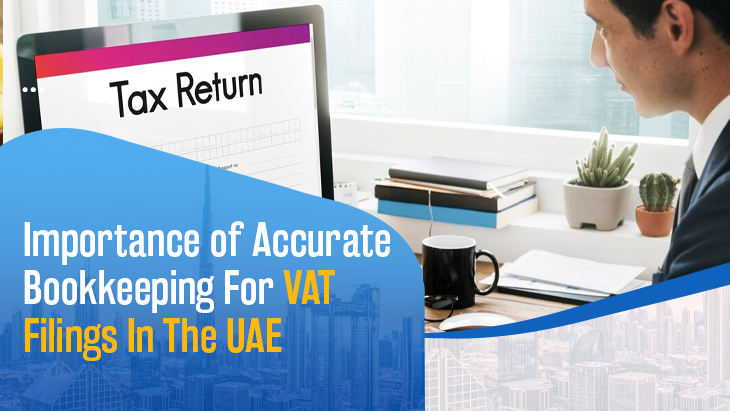As Dubai is a leading global business hub, taxation plays an increasingly significant role in maintaining fiscal responsibility and supporting national growth. One of the most critical elements for businesses operating in the UAE is compliance with Value Added Tax (VAT) regulations.
What is VAT?
VAT is a consumption tax levied on the sale of goods and services. Introduced in the UAE on January 1, 2018, at a standard rate of 5%, VAT is now a fundamental aspect of business transactions. It applies to most goods and services, except those classified as zero-rated or exempt.
Businesses collect VAT on behalf of the government and are responsible for reporting and remitting it to the Federal Tax Authority (FTA). Whether running a small enterprise or a large corporation, understanding how VAT works is crucial for staying compliant.
Importance of VAT Compliance in the UAE
Non-compliance with VAT regulations can lead to substantial penalties, reputational damage, and even business disruptions. The FTA has strict tax registration, invoicing, recordkeeping, and return filing rules. Failure to meet these obligations can hinder your financial and operational performance.
Who Needs to File VAT in Dubai?
Any business with an annual taxable supply and imports exceeding AED 375,000 must register for VAT and file returns regularly. Voluntary registration is also allowed for businesses whose taxable turnover or expenses exceed AED 187,500.
Whether you're undergoing business setup in Dubai or managing a well-established entity, VAT filing is a mandatory responsibility that cannot be overlooked.
Common VAT Filing Mistakes to Avoid
Despite the availability of guidelines and support, many businesses in the UAE still commit errors while filing their VAT returns. Below are the top 10 mistakes you should avoid to ensure seamless compliance.
1. Missing the VAT Registration Deadline
One of the most common mistakes is failing to register for VAT on time. Businesses must apply for VAT registration within 30 days of meeting the mandatory threshold. Delayed registration can result in fines of AED 10,000 or more, depending on non-compliance severity.
2. Incorrect VAT Calculations
Inaccurate VAT computations can result in overpayment or underpayment of tax, which can attract penalties from the FTA.
Overstating or Understating VAT
Some businesses unintentionally inflate or deflate their VAT due to errors in accounting, invoice management, or conversion rates. This often happens when systems aren’t properly integrated or reconciled.
3. Using the Wrong VAT Rate
Another recurring issue is applying the incorrect VAT rate to products or services. For example, certain healthcare and educational services may be zero-rated, while standard commercial activities attract 5%.
Always refer to the FTA’s list of taxable, zero-rated, and exempt goods and services, or seek help from VAT consultants in Dubai.
4. Not Keeping Proper Records
The FTA requires businesses to maintain accurate and organised records for at least five years. This includes invoices, credit notes, import/export documentation, and VAT returns.
Failure to do so can lead to administrative penalties or rejection of input tax claims.
Invest in IT services in Dubai that offer secure digital record-keeping and real-time data access.
5. Ignoring the Reverse Charge Mechanism
Businesses that deal with imports often overlook the reverse charge mechanism (RCM), which shifts the responsibility of VAT payment from the supplier to the buyer.
RCM discrepancies can inflate your tax liabilities and complicate audits if not properly accounted for.
6. Failing to File Returns on Time
VAT returns in the UAE are typically filed quarterly, though some entities may need to file monthly. Missing deadlines even by a day can lead to fines starting from AED 1,000 for the first offence.
Set reminders or use VAT software with built-in deadline alerts to avoid missing crucial dates.
7. Incorrect Input Tax Claims
Input VAT is the tax paid on business purchases, which can be reclaimed. However, claiming ineligible or unsupported input tax is a serious violation.
You must have valid tax invoices and proof of payment, and the purchases must be strictly for business use.
8. Not Understanding Zero-Rated vs Exempt Supplies
Zero-rated supplies allow for input tax recovery, while exempt supplies do not. Confusing the two can lead to incorrect filings and unclaimed recoverable tax.
For instance, exporting goods outside the GCC is typically zero-rated, while residential leases are exempt.
If you're uncertain, consult professionals offering company formation services in Dubai who can guide you through these nuances.
9. Submitting Incomplete VAT Returns
Omitting required data such as sales figures, input VAT, and imports can cause returns to be flagged by the FTA. Incomplete VAT returns often result from rushed filing or a lack of oversight.
Have a qualified tax expert review your return before submission.
10. Not Seeking Professional Help When Needed
Handling VAT internally without sufficient expertise can expose your business to compliance risks. Engaging specialists in VAT services in Dubai ensures you file correctly and on time, while minimising errors and penalties.
Tips to Ensure Smooth VAT Filing
While avoiding mistakes is essential, optimising your VAT processes can bring even more long-term benefits.
1. Stay Updated With UAE Tax Laws
VAT regulations in the UAE are subject to change. Review updates on the FTA website regularly or sign up for newsletters from credible tax advisors in Dubai.
2. Invest in Reliable Accounting Software
Modern accounting software automates VAT calculations, generates audit-ready reports, and syncs with e-invoicing systems. Choose a platform that complies with UAE tax laws and supports multi-currency transactions.
3. Regularly Audit Your VAT Process
Internal audits are conducted every quarter to detect inconsistencies and address them early. Findings and corrective actions are documented to demonstrate compliance during FTA inspections.
4. Train Your Finance Team
Ensure your team understands VAT laws, filing procedures, and how to handle invoices. Regular training sessions reduce the likelihood of human error and increase accountability.
5. Hire VAT Consultants or Experts
Outsourcing to VAT professionals in Dubai saves time and reduces the risk of penalties. Experts stay current with legal requirements and offer custom VAT planning and compliance strategies.
How Bizex LLC Can Help
At Bizex LLC, we understand the complexities of VAT laws in the UAE. From VAT registration and return filing to reverse charge assessments and compliance audits, our experts ensure your business adheres to all tax regulations. We also offer end-to-end assistance for entrepreneurs undergoing company formation in Dubai, guiding them from initial registration to post-licensing compliance.
Our team helps you stay ahead of tax updates, ensures accurate VAT submissions, and protects your business from unexpected penalties. Let us simplify your compliance journey. Contact us today for expert VAT support.











Leave a reply